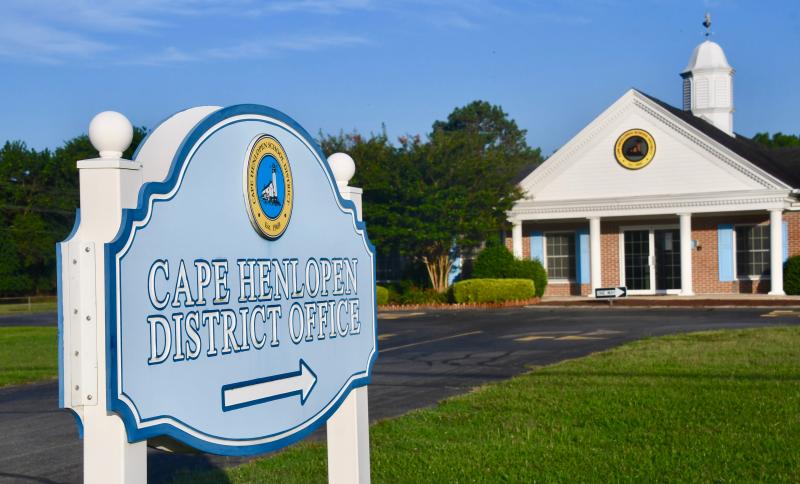Cape teachers respond to board member comments
At the Cape Henlopen school board’s March 24 meeting, two teachers responded to statements made by a board member at the February meeting.
At that meeting, the board voted unanimously to adopt a mask-optional policy after Gov. John Carney announced that day that the mask mandate in schools and on school buses would expire at 6 p.m., March 1.
Before the vote, board member Jessica Tyndall directly addressed a parent in the audience several times and stated the teacher’s union hated the board for its decision to have in-person instruction in the 2020-21 school year.
During public comment March 24, Christy Wimmer, who identified herself as a Cape Henlopen Education Association member, said she watched the video of the Feb. 28 board meeting over and over.
“I am disappointed a school board member would open a verbal attack on a member of the community and during that attack, verbally attack the union,” Wimmer said, adding she was disappointed no one tried to stop it.
CHEA President Lacey Brown said many emotions and misconceptions arose at board meetings and on social media throughout the pandemic. Educators always believed the best place for instruction is in school, Brown said, and CHEA advocated for a safe work environment and the use of mitigation efforts.
In September 2020, the union took a vote of no confidence in Superintendent Bob Fulton and the school board, Brown said, based on concerns over the return-to-school timeline. The union knew the vote could damage relationships, Brown said, but knew these relationships could be repaired over time.
“There is no one group responsible for the success of our district,” Brown said. “We are all heroes in our way. Success during the pandemic was a collaborative effort by all of the parties involved – the community, parents, students, educators, administrators and the school board.
“Despite the difficulties and fears educators felt and verbalized at the start and during the pandemic, CHEA and every educator has worked with the district to strengthen our relationship and work to keep our district’s promise of excellence, equity and responsiveness for every student in every classroom, every day,” Brown said.
Moving forward, Brown said, she is confident this relationship will continue to grow and strengthen. Tyndall watched each teacher as they spoke, and the board thanked teachers for their comments.
Legends, impact fees, funds discussed
Cape Superintendent Bob Fulton said the district received six nominations for Legends induction. Legends are retired district coaches or current coaches over age 65 who have brought outstanding honor to the school community through their longevity, record of success, and other aspects of service to student-athletes. A committee comprising representatives from Milton, Lewes and Rehoboth will review nominations, Fulton said.
“Up to two nominees can be honored every three years, but because it has been more than three years since our last Legends were selected, I will be presenting up to four nominees this June,” Fulton said.
Previous inductees include Carolyn Ivins, Janet Nowakowski, Frank Coveleski, Bob Edgerton, Tony Georgiana, Don Hanley, Tom Hickman, Ruth Sponaugle Skoglund, Dan Cook and Dave Frederick.
Reporting on a meeting of the citizens budget oversight committee, board member Janet Maull-Martin said the group discussed school impact fees levied on new construction in New Castle and Kent counties.
In every Delaware county but Sussex, builders – many of which operate statewide – pay an impact fee toward capital finances for major school construction and renovation projects. New Castle County has had a school impact fee since 1999 and Kent County since 2006.
More houses are being built in Sussex County, Maull-Martin said, leading to more families and more students enrolling in the district. Tax revenues don’t keep up with growth, she said, and it’s time to push for impact fees in Sussex County.
“I know it’s going to be a fight, but I’m ready to fight that fight to get this done,” Maull-Martin said.
In other financial matters, board member Janis Hanwell said in 2018, the state withheld $26 million from the state education budget, citing tight budget constraints in what Hanwell described as a give-back that has occurred every year since. The give-back was spread across districts from allocations they should have received based on formulas in the education piece of the state budget, Hanwell said.
Schools have been trying to recoup the retained funds for years, Hanwell said, since the original need for withholding the funds no longer exists. If the state continues to withhold funding through the next fiscal year, the cumulative amount withheld would be $156 million since 2018, Hanwell said.
The Delaware School Boards Association has formally requested the Joint Finance Committee remove the give-back from this coming year’s budget bill, Hanwell said.
Over the past four years, Cape’s share of the $156 million is $4.8 million, Director of Business Operations Oliver Gumbs said after the meeting.





















































